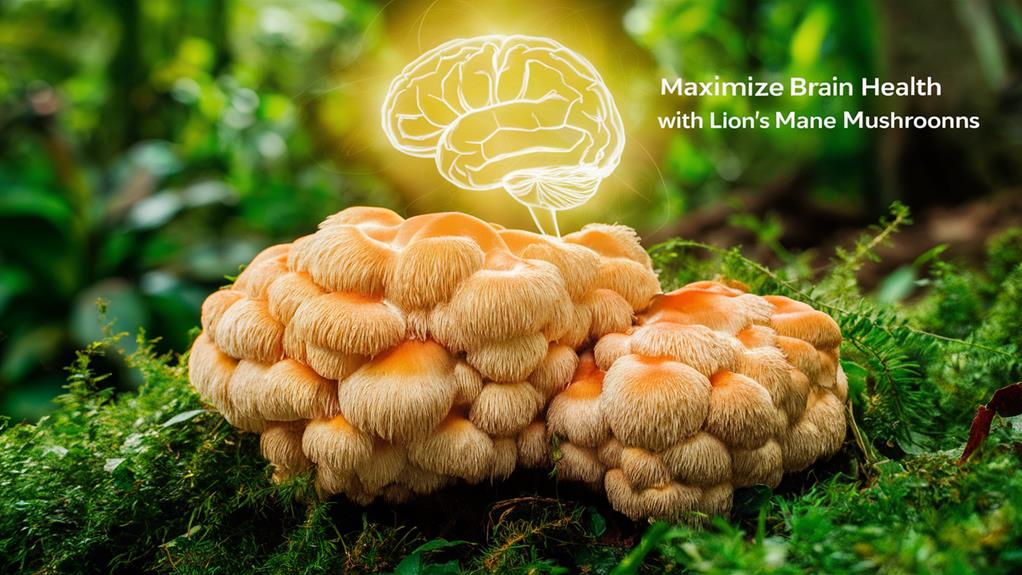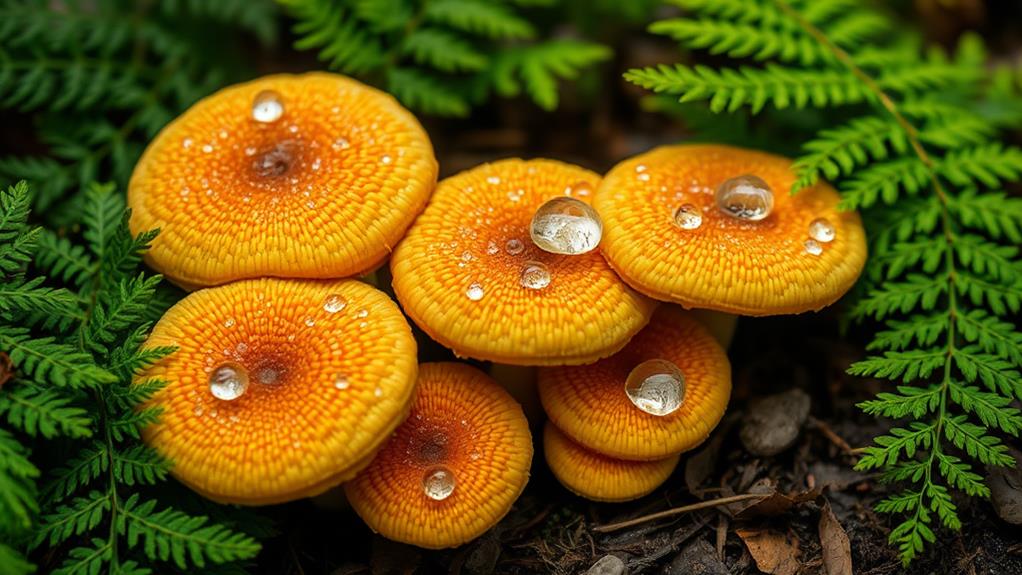
To maximize your brain health with Lion's Mane mushrooms, consider incorporating them into your daily routine. These mushrooms contain compounds that promote nerve growth factor production, which enhances cognitive function and memory. Regular consumption can improve mood, reduce anxiety, and support overall mental well-being. Lion's Mane also offers antioxidant and anti-inflammatory benefits that protect your brain from damage. Whether you choose fresh, dried, or as supplements, aim for a daily dose of 3 to 5 grams. By understanding how to effectively integrate this superfood into your diet, you can enhance your cognitive abilities further.
Cognitive Benefits of Lion's Mane

Lion's mane mushrooms are more than just a culinary delight; they hold remarkable potential for enhancing cognitive health. These fascinating fungi contain compounds called hericenones and erinacines, which promote nerve growth factor (NGF) synthesis. This process can double neuron growth, boosting your cognitive function significantly.
Cognitive function enhancement has been observed, making lion's mane a compelling choice for those aiming to sharpen their minds. If you're looking to sharpen your mind, lion's mane mushrooms might be the answer.
Research shows that daily supplementation of just 1 gram of lion's mane for 49 weeks improved cognitive scores in mild Alzheimer's patients, showcasing its neuroprotective effects. This means it could help protect your brain from damage and support overall function.
Additionally, studies suggest that lion's mane accelerates recovery from nervous system injuries by stimulating nerve cell growth and repair.
In animal studies, lion's mane extract has demonstrated significant improvements in memory and learning abilities, particularly in spatial memory during maze tests. These findings suggest that incorporating lion's mane mushrooms into your diet could enhance memory formation and cognitive performance.
Mental Health Improvements
When it comes to mental health improvements, lion's mane mushrooms show promising potential. Research suggests they may help reduce anxiety and enhance mood by supporting brain cell regeneration and reducing inflammation.
Additionally, studies have indicated that regular consumption can lead to a reduction in subjective stress levels and improve mental clarity, making this mushroom a holistic approach to emotional well-being mood enhancement benefits.
With regular use, you might find that your stress levels decrease, making this mushroom a valuable addition to your wellness routine.
Anxiety Reduction Benefits
In recent years, research has highlighted the potential of lion's mane mushrooms in reducing anxiety and enhancing mental health. Studies suggest that these powerful fungi can help combat inflammation, which is often linked to anxiety disorders. When inflammation decreases, you might notice a reduction in anxiety symptoms, making lion's mane an appealing option for many.
Animal research has shown that lion's mane can regenerate brain cells and improve the function of the hippocampus, a part of the brain essential for emotional regulation. This regeneration might correlate with decreased anxiety and depressive behaviors.
In a small study, menopausal women who consumed lion's mane cookies reported lower anxiety levels, indicating that this mushroom could benefit specific groups.
While more human studies are needed, the evidence so far suggests that incorporating lion's mane into your diet may help ease anxiety and improve overall mental health. Whether you choose to take supplements or enjoy delicious mushroom-infused dishes, you could experience positive changes in your emotional well-being.
Embracing lion's mane might be a step toward a calmer, more balanced state of mind.
Mood Enhancement Effects
Building on the benefits of anxiety reduction, lion's mane mushrooms also show promise in enhancing mood and overall mental well-being.
These unique fungi contain bioactive compounds like hericenones and erinacines, which may help improve cognitive function while positively impacting your mood. Research suggests that lion's mane mushrooms exhibit anti-inflammatory properties, potentially reducing symptoms of anxiety and depression linked to chronic inflammation.
In animal studies, lion's mane has been shown to regenerate brain cells and boost hippocampus function. This connection hints at its potential to reduce anxiety and depressive behaviors in humans as well.
A small study highlighted that menopausal women consuming lion's mane cookies experienced lower anxiety levels, indicating its mood-enhancing effects.
Furthermore, chronic supplementation of lion's mane has demonstrated a trend toward reduced subjective stress after just 28 days, with participants reporting lower stress scores compared to those taking a placebo.
Stress Management Support
Lion's mane mushrooms offer a natural ally for stress management, helping you tackle the pressures of daily life. These fascinating fungi have anti-inflammatory properties that may reduce chronic inflammation linked to anxiety and depression, ultimately improving your mental health.
Studies suggest that lion's mane can regenerate brain cells and enhance the function of the hippocampus, a brain area crucial for emotional regulation. This connection can lead to reduced anxiety and depressive behaviors, making it a valuable tool for managing stress.
In one small study, menopausal women who enjoyed lion's mane cookies reported lower anxiety levels, reinforcing the idea that this mushroom can support stress management. When consumed regularly, lion's mane has shown a trend toward reduced subjective stress after just 28 days. This means you might experience enhanced overall mood and emotional well-being.
Moreover, lion's mane mushrooms have been linked to improvements in cognitive performance. This boost in focus and clarity can be especially beneficial during stressful times, helping you stay sharp and resilient.
Immune System Support

Supporting your immune system is crucial for maintaining overall health, and lion's mane mushrooms can play a significant role in this process. These remarkable fungi contain beta-glucans, which may enhance your immune response by modulating immune system activity.
Research shows that lion's mane also boasts powerful antioxidant properties, helping to reduce oxidative stress that can negatively impact your immune function. Additionally, medicinal mushrooms like lion's mane have been linked to enhanced immune function, showcasing their potential to improve overall immunity.
Animal studies have demonstrated that lion's mane mushrooms can enhance the activity of immune cells, improving your body's defense mechanisms against various pathogens. In fact, daily supplementation of lion's mane nearly quadrupled the lifespan of mice after exposure to a salmonella injection, highlighting its potential to boost immunity significantly.
While these findings are promising, it's important to note that further clinical trials are needed to confirm the immune benefits of lion's mane mushrooms in humans. Most current evidence comes from animal studies, so more research will help us understand how lion's mane can support your immune system effectively.
Incorporating lion's mane into your daily routine could be a proactive step toward better immune health and overall well-being.
Anti-Inflammatory Properties
Chronic inflammation can be a silent disruptor of health, but incorporating lion's mane mushrooms into your diet might help counteract its effects. These remarkable fungi exhibit significant anti-inflammatory properties, which can be particularly beneficial for those dealing with various health conditions, including autoimmune diseases.
Research shows that lion's mane can help reduce inflammatory markers in animal studies, suggesting it may offer relief for issues like arthritis. The anti-inflammatory benefits of lion's mane mushrooms extend beyond just reducing inflammation. They also help protect your brain from oxidative stress, which can further support your overall health.
In fact, lion's mane ranks fourth in antioxidant activity among 14 mushroom species, indicating its strength in combating oxidative damage to brain and nerve cells. While the current findings are promising, ongoing studies are essential to determine effective dosages and long-term impacts of lion's mane on inflammation and oxidative stress in humans.
Antioxidant Effects

Lion's mane mushrooms offer impressive antioxidant effects that can protect your cells from damage.
By neutralizing free radicals, they help reduce oxidative stress, which is essential for maintaining brain health.
Plus, their ability to lower inflammation can contribute to your overall well-being, potentially reducing the risk of neurodegenerative diseases.
Cellular Protection Mechanisms
In the quest for optimal brain health, understanding cellular protection mechanisms is crucial, and the antioxidant effects of lion's mane mushrooms stand out.
These mushrooms are ranked fourth in antioxidant activity among 14 mushroom species, showcasing their ability to combat oxidative stress and shield your cells from damage. Their antioxidant properties can be especially beneficial in reducing chronic inflammation, which is linked to various health conditions, including neurodegenerative diseases.
Here are some key benefits of lion's mane mushrooms:
- Reduces inflammatory markers, helping to protect your cells from inflammation-related damage.
- Enhances the activity of antioxidant enzymes, thanks to their rich bioactive compounds.
- Potentially protects brain and nerve cells from oxidative damage, supporting cognitive health.
Free Radical Neutralization
Antioxidants play a vital role in maintaining your brain health, and lion's mane mushrooms are a powerful ally in this fight against oxidative stress.
These remarkable fungi rank fourth in antioxidant activity among 14 mushroom species, showcasing their ability to neutralize free radicals effectively. By incorporating lion's mane into your diet, you can help protect your brain cells from oxidative damage, which is linked to various neurodegenerative diseases.
Research indicates that lion's mane extract may reduce markers of oxidative stress, potentially supporting better brain health and function. This is particularly important as we age, since oxidative damage can contribute to cognitive decline.
Regular consumption of lion's mane mushrooms could be a simple yet impactful way to combat this process.
Moreover, the rich antioxidant content in lion's mane not only benefits your brain but also contributes to your overall health by reducing oxidative stress associated with chronic inflammation.
Inflammation Reduction Benefits
Chronic inflammation can take a toll on your overall health, and lion's mane mushrooms offer promising anti-inflammatory benefits. These unique fungi are known for their strong anti-inflammatory properties, which can help with inflammation reduction linked to various health issues, including autoimmune diseases.
Research shows that lion's mane extract can significantly reduce inflammatory markers, which is especially beneficial for conditions like arthritis.
Here are some key reasons to consider lion's mane for inflammation reduction:
- Rich in Antioxidants: Lion's mane ranks fourth in antioxidant activity among mushroom species, protecting your cells from oxidative stress caused by free radicals.
- Boosts Immune Function: Animal studies indicate that lion's mane can enhance the activity of immune cells, improving your body's defense against oxidative damage.
- Supports Brain Health: By reducing oxidative damage in brain and nerve cells, lion's mane can promote overall brain health and cognitive function.
Incorporating lion's mane mushrooms into your diet could be a beneficial step toward better health by reducing inflammation and supporting your immune function.
Cardiovascular Advantages
When it comes to boosting cardiovascular health, lion's mane mushrooms offer impressive benefits that can make a real difference. Research shows that lion's mane can significantly improve fat metabolism, leading to lower triglyceride levels. In one study, rats on high-fat diets experienced a remarkable 27% reduction in triglycerides and a 42% decrease in weight gain. This suggests that incorporating lion's mane into your diet could help manage your weight and improve heart health.
Additionally, lion's mane extracts prevent cholesterol oxidation, which is crucial for reducing the risk of plaque buildup in your arteries. The compounds found in these mushrooms, such as hericenone B, may even decrease blood clotting rates, lowering the chances of heart attacks and strokes.
Moreover, daily supplementation with lion's mane has shown to enhance the activity of immune cells, strengthening your body's defense mechanisms. This can lead to improved cardiovascular health overall.
Gastrointestinal Protection

Gastrointestinal protection is another remarkable benefit of lion's mane mushrooms that you shouldn't overlook. These mushrooms can help safeguard your digestive system from ulcers, especially those caused by H. pylori bacteria. Research shows that lion's mane may outperform traditional medications in preventing alcohol-induced ulcers and could also support overall gastrointestinal health.
Here are a few key points to consider:
- H. pylori defense: Lion's mane contains bioactive compounds that may inhibit the growth of H. pylori, helping to protect your stomach lining.
- Ulcer prevention: This mushroom has shown potential in preventing digestive ulcers, especially those caused by NSAIDs and alcohol.
- Inflammatory bowel health: Though more research is needed, animal studies suggest that lion's mane could be beneficial for inflammatory bowel diseases.
Incorporating lion's mane into your daily routine might help maintain a healthy gastrointestinal environment.
As you prioritize your health, don't forget that keeping your digestive system in check is crucial for overall well-being. By embracing the protective properties of lion's mane mushrooms, you may reduce your risk of digestive disorders while enjoying their other brain-boosting benefits.
Diabetes Management
Managing diabetes effectively can be challenging, but lion's mane mushrooms might offer a promising ally in this endeavor. Research suggests that these remarkable mushrooms can improve blood sugar management. In animal studies, significant reductions in blood sugar levels were seen in both normal and diabetic mice after consuming lion's mane. This is largely due to active compounds like hericenones, which block the enzyme alpha-glucosidase. By doing this, they help control how carbohydrates break down in your intestines, making diabetes management easier.
Moreover, lion's mane may also help with nerve health. In diabetic models, supplementation with lion's mane has been linked to a reduction in complications related to diabetes, including diabetic nerve pain. Mice with diabetic nerve damage showed relief after receiving lion's mane extracts, highlighting its potential benefits.
While these findings are exciting, it's important to note that further clinical trials are needed to confirm the efficacy and safety of lion's mane mushrooms for diabetes management in humans. As you consider options for managing your diabetes, lion's mane might just be a beneficial addition to your regimen.
Cancer-Fighting Potential

Lion's mane mushrooms may hold remarkable potential in the fight against cancer. Research shows that extracts from this fascinating fungus can induce faster cancer cell death in lab settings, especially in liver, colon, stomach, and blood cancer cells.
In animal studies, lion's mane extract slowed the spread of colon cancer by an impressive 69%, highlighting its strong cancer-fighting potential.
The secret lies in the bioactive compounds found in lion's mane, such as hericenones and erinacines. These compounds are believed to promote cell apoptosis in malignant cells, which means they help trigger the process of programmed cell death.
Here are a few key points to consider:
- Lion's mane extract demonstrates significant effects against various cancer types.
- Ongoing research is needed to explore its therapeutic applications in humans.
- Understanding the mechanisms through which lion's mane affects cancer cells is crucial for future studies.
While the findings are promising, it's important to note that human trials are still lacking.
As research progresses, lion's mane could become a valuable ally in the fight against cancer, but more studies are necessary to validate its effects in clinical settings.
Usage and Recommendations
When it comes to using lion's mane mushrooms, you've got plenty of options—whether you prefer fresh, dried, tea, or supplements, there's something for everyone.
For the best results, aim for a daily dosage of 3 to 5 grams, but remember, it's smart to check with a healthcare provider first.
Also, if you have any mushroom allergies, be cautious, as reactions can happen.
Consumption Methods Explained
There are several ways you can enjoy lion's mane mushrooms, each offering unique benefits and flavors. This remarkable fungus can be consumed fresh, cooked, dried, or steeped as tea, boasting a taste reminiscent of seafood.
If you're looking to improve your cognitive function, here are some popular consumption methods to consider:
- Fresh or Cooked: You can sauté lion's mane in butter or olive oil, adding it to dishes for a delicious and nutritious boost.
- Tea: Steeping dried lion's mane in hot water can create a soothing tea that's easy to digest and packed with beneficial compounds.
- Capsules or Powders: If convenience is key, consider taking lion's mane in capsule form or adding powder to smoothies for a quick, effective way to support brain health.
While lion's mane is generally safe for most people, it's essential to source your products from reputable suppliers due to the lack of regulation in the dietary supplement industry.
Always consult with a healthcare provider if you have concerns, especially if you have a mushroom allergy.
Enjoy exploring these consumption methods to maximize the benefits of this incredible mushroom!
Recommended Dosage Guidelines
To reap the cognitive benefits of lion's mane mushrooms, understanding the recommended dosage is important. Typically, the recommended dosage for cognitive improvement is around 3 to 5 grams daily. Of course, this can vary based on your age and health conditions.
You can consume lion's mane in different forms, such as fresh mushrooms, capsules, powders, or tinctures, giving you flexibility in how you include it in your diet.
For quicker effects, a pilot study showed that taking 1.8 grams—equivalent to three 600 mg capsules—resulted in notable cognitive improvements within just 60 minutes.
However, because there are no established guidelines for lion's mane dosage, it's wise to consult a healthcare provider for personalized recommendations. They can help ensure you're using the right dosage for your needs and monitor any adverse symptoms during supplementation.
Safety Considerations Noted
Lion's mane mushrooms offer a promising avenue for enhancing cognitive health, but safety considerations are essential before diving in.
Although these mushrooms are generally safe for most people, it's crucial to think about your individual needs and potential risks.
Here are some key safety considerations to keep in mind:
- Consultation: Always consult with a healthcare provider before starting lion's mane supplementation, especially if you have existing health conditions or take medications.
- Mushroom allergies: If you have a known mushroom allergy, approach with caution. Allergic reactions can occur and may be serious.
- Dosage: The recommended daily dosage typically ranges from 3 to 5 grams, but this can vary depending on your age and health.
Conclusion
Incorporating lion's mane mushrooms into your diet can greatly enhance your brain health. Research shows that a student named Sarah improved her focus and memory after taking lion's mane supplements for just a month. With its cognitive benefits, immune support, and potential to combat inflammation, this powerful mushroom is a smart choice for anyone looking to boost their overall well-being. So, why not give it a try? Your brain will thank you!
